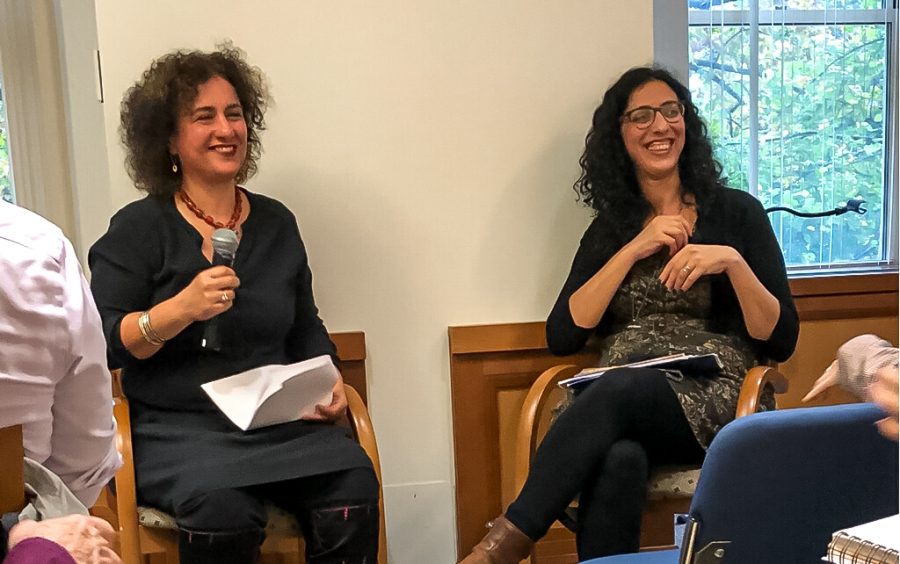The Suffolk University community had the privilege of speaking to award-winning Israeli author Ayelet Tsabari. The author, famous for her memoir “The Art of Leaving,” held a discussion in 73 Tremont’s Poetry Center last Thursday.
The room was packed with an intrigued audience, all there to hear Tsabari’s moving story.
She openly discussed writing her book and answered questions from the audience throughout the event. Suffolk journalism professor Shoshana Madmoni-Gerber helped facilitate the conversation by asking Tsabari questions and encouraging audience members to participate as well.
In her book, Tsabari discusses her struggle in finding her identity as a Yemeni woman who grew up on the outskirts of Tel Aviv.
“The Art of Leaving” draws from Tsabari’s experiences with grief, finding love, raising a family and searching for her own identity along the way. The book is a composition of essays written over a span of 12 years.
“I lived my life, making sure I had stories to tell,” said Tsabari during the event.
As a Yemeni woman, Tsabari struggled with her identity growing up in Tel Aviv. Arab Jews, otherwise known as the Mizrahim, often face discrimination in Israel based on their arabness. Tsabari, who recognized that she is easily identified as an Arab by her physical features, struggled to accept this part of her identity. She was embarrassed when her grandmother would speak Arabic, and suppressed that side of her cultural identity for the majority of her childhood.
“There’s something about writing a narrative of your life that does bring clarity,” said Tsabari during the event.
Tsabari grew up in Tel Aviv but eventually moved to Canada to start a new life of her own. While living in Canada, she met her husband and started a family, but still felt like an outsider because of where she was from.
About two years ago, Tsabari and her family moved back to Tel Aviv. She wanted her daughter to be immersed in the culture of Israel and to learn Hebrew as a primary language.
She changed various aspects of her career — one of the most significant being when she shifted the language she writes in from Hebrew to English. This was a point of contention for her and her following of readers.
“I was a new writer, I was a different writer, and ultimately it turned out, a better writer,” said Tsabari speaking about writing in English rather than Hebrew.
In Tsabari’s life, she never saw herself writing in English because it was her second language. After taking about a two year break from writing, which she accredits to writer’s block, Tsabari began writing in English to explore the differences of storytelling.
“I knew that most people I knew personally wouldn’t read [the book],” said Tsabari during the event. After switching to writing in English, she knew most of her audience wouldn’t be as inclined to read the book because most of them exclusively spoke and read Hebrew.
The author explained that writing in a new language wasn’t a specific choice; it happened gradually.
She announced towards the end of the event that she is officially working on a novel that is going to be fiction, but she gave no other details.
Tsabari taught as a professor in Canada during the 20 years she lived there at the University of Toronto’s School of Continuing Studies. She now teaches creative nonfiction courses at Tel Aviv University.
“I really try to understand where the writers come from,” said Tsabari to The Suffolk Journal, while explaining how her memoir affects how she teaches. “I understand that they’re experts of their own experiences and not be prescriptive to writing guidelines, understand that they have a voice and try my best not to crush that.”
Both Madmoni-Gerber and Tsabari are Yemeni women who left Israel and are now involved in the literary community. They met while participating on a panel dedicated to Yemeni history and cultural identity.
“It felt like someone was writing about my experience, which is always kind of surreal,” said Madmoni-Gerber.
Madmoni-Gerber teaches a variety of courses at Suffolk University in the Department of Communication and Journalism and includes a reading from “The Art of Leaving” in her class curriculum.
“It shows the process of gaining identity and the struggles some may go through for that,” said Madmoni-Gerber.




















